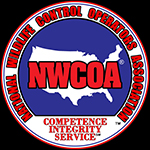Get Rid of Racoons
Despite their cute look, raccoons may pose serious issues for households and businesses. These nocturnal animals are known to cause property damage, sift through waste, and construct nests in attics. If raccoons are not managed, they can present health risks and result in costly structural issues. For raccoon removal and prevention to be successful, it is crucial to comprehend their behaviour, nesting patterns, and infestation indicators.
Get Your FREE Quote
Complete the quick form below and one of our experts will get back to you as soon as we can.
Identification of Raccoons
Raccoons (Procyon lotor) are medium-sized mammals native to North America, including the Greater Vancouver and Fraser Valley regions. They have successfully adapted to urban settings, infiltrating business districts, residential neighbourhoods, and even industrial locations.
Key Physical Characteristics:
Size: Adult raccoons typically weigh between 10–30 lbs (4.5–14 kg) and measure 24–38 inches (60–95 cm) in length, including their bushy tail.
Colour: Their fur is grayish-brown, with a distinctive black “mask” around their eyes and ringed tails.
Dexterous Paws: Raccoons have highly skilled front paws, allowing them to open containers, manipulate objects, and even unlock latches.
Nocturnal Behaviour: These animals are primarily active at night, searching for food and shelter.
Raccoon Breeding and Baby Season
Raccoons reproduce once a year, with mating season occurring sometime between January and June, with the peak occurring between March and April. After a gestation period of about 63 days, females give birth to 2–5 kits in the spring (April to June). Baby raccoons remain dependent on their mother for several months, staying in the den until they are strong enough to explore.
During baby season, raccoons become more aggressive in defending their young. This is when infestations are more likely, as mothers look for secure nesting spots such as attics, crawl spaces, and chimneys. If you suspect raccoons on your property, contacting a raccoon exterminator early can prevent them from settling in.
Habitat: Where Do Raccoons Nest?
Raccoons are highly adaptable and thrive in a variety of environments, from forests to busy city streets. Being opportunistic animals, they seek out locations that provide food, water, and shelter.
Common Nesting Sites:
- Attics and Roof Spaces: Raccoons easily access rooftops using trees, downspouts, or power lines. They enter attics through loose shingles, broken vents, or chimneys to create warm, secure dens.
- Crawl Spaces and Basements: If there are gaps or damaged vents, raccoons may take shelter in crawl spaces, garages, or basements.
- Sheds and Decks: Raccoons frequently build dens under porches, decks, and storage sheds, especially if they find insulation or nesting materials.
- Tree Hollows and Abandoned Structures: In the wild, raccoons prefer tree cavities or rock crevices. However, in urban areas, they often use abandoned buildings and construction sites for shelter.
Why Choose Ridall Pest Control?
At Ridall Pest Control, we don’t just remove pests—we provide peace of mind. We are experts at providing long-lasting, safe, and efficient pest control solutions for both residential and commercial properties, having over 30 years of experience.
No matter what kind of pest you’re dealing with—rodents, insects, birds, or wildlife—our dedicated staff ensures sure your home or place of business is pest-free.
5 Interesting Facts About Raccoons
1. Raccoons Are Extremely Intelligent
Raccoons have problem-solving skills comparable to primates. They are adept at evading basic deterrents because, according to studies, they can retain puzzle solutions for up to three years.
2. Their Hands Are Highly Sensitive
Raccoons have five dexterous fingers with a high concentration of nerve endings, allowing them to grasp, manipulate, and even “feel” food underwater without looking.
3. They Adapt to Almost Any Environment
Originally forest dwellers, raccoons now thrive in urban, suburban, and rural areas, using attics, chimneys, and crawl spaces as nesting sites—leading to frequent raccoon removal calls.
4. Raccoons Are Omnivorous Opportunists
From fruits and nuts to small animals and garbage, raccoons will eat almost anything. Because of their versatility, homeowners are constantly looking for raccoons near me to prevent them from rifling through gardens and trash cans.
5. Raccoons Have Unique Communication Methods
Raccoons use over 200 different sounds to communicate, including chirps, growls, and purrs. Mothers and babies have a distinctive “chatter” to stay connected.
Identifying Infestation Signs
Spotting a raccoon infestation early can save you from expensive property damage and potential health risks. Here are the most common signs to watch for:
1. Unusual Noises at Night
Raccoons are nocturnal, meaning they are most active after dark. If you hear scratching, thumping, or chattering sounds coming from the attic, walls, or crawl spaces, you may have a raccoon problem. These noises are often louder in the spring when mothers are caring for their kits.
2. Damage to Roofs, Vents, and Siding
Raccoons are strong climbers and can rip through shingles, soffits, and vents to enter homes. Signs of damage include:
- Torn insulation or exposed wires
- Bent or broken roof vents
- Claw marks on wooden surfaces
If you notice these issues, call a raccoon exterminator company like Ridall Pest Control can help assess the damage and prevent further entry.
3. Tipped Over Garbage Cans and Scattered Trash
Raccoons are infamous for rummaging through garbage in search of food. If your trash bins are frequently knocked over or you find scattered food waste in your yard, a raccoon may be the culprit.
4. Foul Odours and Droppings
A persistent musky odour in attics, garages, or crawl spaces may indicate a raccoon den. Their larger-than-rodent-sized droppings can spread parasites like roundworms, which can be dangerous for pets and people alike.
5. Tracks and Paw Prints
Raccoon tracks resemble tiny human handprints, with long fingers and a distinctive five-toe pattern. Tracks in mud, snow, or dust may be found close to sites of entry.
6. Visible Raccoon Sightings
If you frequently spot raccoons near your home or business, they may be nesting close by. While seeing a single raccoon may not be a concern, regular sightings suggest a growing infestation.
7. Pets Acting Unusual
Dogs or cats may bark, growl, or paw at specific areas where raccoons are present. If your pet seems agitated near vents, chimneys, or storage sheds, it could indicate hidden raccoon activity.
Feeding Habits of Raccoons
Raccoons are omnivores, meaning they eat both plant and animal-based foods. Their diet varies depending on location, food availability, and seasonal changes. Because they are opportunistic feeders and will eat whatever is most readily available, they regularly infiltrate homes and businesses in quest of food.
What Do Raccoons Eat?
- Fruits & Vegetables: Berries, apples, corn, nuts, and seeds are dietary staples.
- Protein Sources: Insects, small rodents, frogs, fish, and bird eggs provide essential nutrients.
- Garbage & Human Food Waste: Raccoons are notorious for raiding trash cans, eating leftovers, and foraging in dumpsters.
- Pet Food: If left outdoors, raccoons will steal dog and cat food, making pet feeding stations a major attractant.
- Carrion: As scavengers, raccoons will consume dead animals, making them a natural part of the ecosystem.
How Do Raccoons Find Food?
- Dexterous Paws: Raccoons can open latches, flip trash bin lids, and even turn doorknobs to access food.
- Nighttime Foraging: They search for food primarily at night, making them difficult to spot during the day.
- Strong Memory & Learning Ability: Once a raccoon finds a reliable food source, it will return repeatedly unless deterred.
Because raccoons are so adaptable, eliminating food sources is a critical step in raccoon removal. Speak with a raccoon exterminator from Ridall Pest Control to evaluate the situation and stop additional problems if you think raccoons are feeding close to your house.
Potential Dangers of Raccoons
While raccoons may appear harmless, their presence near homes or businesses can result in serious health and property risks. Ignoring a raccoon infestation can result in deadly encounters, expensive damages, and the spread of illness.
Health Risks from Raccoons
- Rabies Transmission: Raccoons are one of the top carriers of rabies in North America. A bite or scratch from an infected raccoon can be fatal without prompt medical attention.
- Parasites & Diseases: Leptospirosis, salmonella, E. coli, and raccoon roundworm (Baylisascaris) are all serious health risks to people and pets that can be found in raccoon excrement.
- Airborne Contaminants: Dried raccoon droppings can release harmful spores that cause respiratory infections, especially in enclosed spaces like attics.
- Pet Conflicts: Raccoons are territorial and can seriously injure dogs or cats if they feel threatened. They also compete with pets for food left outside.
Property Damage from Raccoons
- Roof & Attic Destruction: Raccoons rip open vents, tear insulation, and damage wiring, leading to costly repairs and fire hazards.
- Blocked Gutters & Chimneys: Nesting raccoons clog gutters and vents with leaves, sticks, and debris, increasing the risk of water damage.
- Destroyed Gardens & Landscaping: Raccoons dig up lawns in search of grubs and eat garden crops like corn and melons.
- Trash Scattering: They frequently tip over garbage bins, leaving food scraps and waste strewn across properties.
When dealing with an infestation, raccoon exterminator services are crucial, as these risks demonstrate. A professional raccoon removal company can safely remove raccoons, disinfect affected areas, and prevent further property damage.
Legal Compliance
Raccoons are protected under the BC Wildlife Act, making unauthorized removal methods risky and potentially illegal in the Greater Vancouver and Fraser Valley regions. Ridall Pest Control – the best raccoon exterminator company understands these laws and ensures that all removal techniques follow the correct protocols.
Raccoon Removal Process
Eliminating raccoons from a property requires a combination of deterrents, exclusion techniques, and professional assistance. Because raccoons are intelligent and persistent, simply scaring them away is not enough—long-term solutions are necessary.
1. Habitat Modification
Reducing the availability of food and shelter is the first step in raccoon removal:
- Secure Trash Bins: Use animal-proof garbage cans with locking lids.
- Remove Pet Food & Bird Feeders: Store pet food indoors and clean up spilled birdseed.
- Eliminate Water Sources: Fix leaky outdoor faucets and remove standing water.
- Seal Entry Points: Cover vents, repair broken screens, and close gaps in walls or roofs.
2. Humane Trapping & Removal
For severe infestations, professional raccoon exterminator services may use humane traps or one-way doors to remove raccoons humanely. Because raccoons can turn hostile when cornered, this procedure should always be performed by professionals.
3. Exclusion Techniques
Once raccoons have been humanely removed from a space, physical barriers help prevent their return by:
- Installing Chimney Caps & Vent Covers: Raccoons often enter homes through open chimneys and roof vents.
- Installing Fencing: A buried fence around gardens or compost bins prevents digging.
- Blocking Crawl Spaces & Under Decks: Seal gaps under porches, sheds, and decks to eliminate nesting spots using galvanized hardware cloth and stainless steel fasteners.
4. Cleaning & Sanitization
After removing raccoons, cleaning the affected area is essential to prevent disease spread:
- Remove Feces & Nesting Materials: Raccoon droppings should be handled with protective clothing since they contain dangerous viruses.
- Disinfect Surfaces: Professional cleaners use biohazard treatments to neutralize bacteria.
- Deodorize Affected Areas: Strong odours from raccoon urine and feces can attract new animals if not removed.
5. Professional Assistance for Long-Term Prevention
If DIY efforts fail or the infestation is severe, hiring a raccoon exterminator company is the best solution. Experts use legal animal control methods and exclusion strategies to remove raccoons humanely and keep them from coming back.
Need Professional Raccoon Removal? Contact Us Today!
If you’re dealing with raccoons on your property, don’t wait until the damage gets worse. For the protection of your house and place of business, Ridall Pest Control offers safe, compassionate, and efficient raccoon exterminator services.
Call us now at 604-580-2847
Email us at info@ridallpestcontrol.ca
Visit www.ridallpestcontrol.ca
For an expert raccoon exterminator company, trust Ridall Pest Control—the #1 choice for homeowners and businesses!
FAQ
How do I know if I have a raccoon problem?
Common signs include thumping noises in the attic, tipped-over garbage bins, tracks with five toes, and damage to vents or soffits. A raccoon exterminator company can perform a comprehensive inspection if you suspect a problem.
Are raccoons dangerous to humans?
Yes, leptospirosis and rabies are among the diseases that raccoons can transmit. They may also have dangerous parasites in their feces. If you see one acting aggressive or overly friendly, call a raccoon exterminator immediately.
Can raccoons damage my home?
Of course. As they nest, they damage ducts, chew wiring, and rip insulation. If you suspect a raccoon has moved in, Ridall Pest Control, the professional raccoon exterminator company, are the safest and most effective way to evict them.
What’s the best way to prevent raccoons?
Secure garbage bins, seal entry points, and remove food sources like pet food and fallen fruit. If raccoons keep returning, a raccoon removal company such as Ridall Pest Control can provide permanent exclusion solutions.
Do raccoons return after being removed?
Raccoons are territorial and will try to return to a familiar nesting spot. Because of this, it’s essential to hire a raccoon exterminator company that not only gets rid of the raccoons but also seals entry points and uses prevention techniques.




